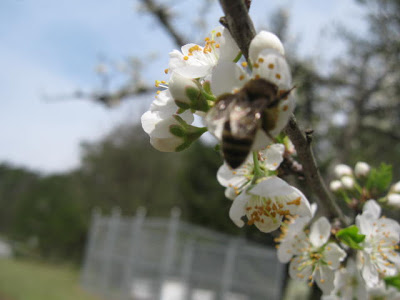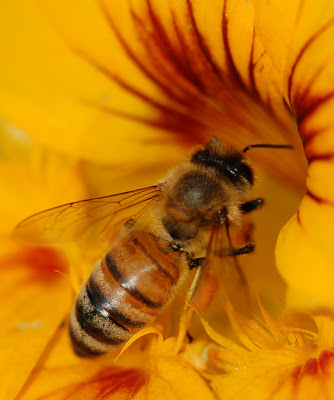Animals
 I have spent the better part of this year preparing to become our full time beekeeper. I have attended several seminars and webinars, also. What I have learned is this....for as many beekeepers as there are, there are just as many opinions on how best to keep bees. This past weekend I attended a seminar at Bjorn Apiaries. Mike Thomas, a former State Bee Inspector and full-time beekeeper/breeder spoke on the subject of Sustainable Beekeeping....a More Natural Approach.
I have spent the better part of this year preparing to become our full time beekeeper. I have attended several seminars and webinars, also. What I have learned is this....for as many beekeepers as there are, there are just as many opinions on how best to keep bees. This past weekend I attended a seminar at Bjorn Apiaries. Mike Thomas, a former State Bee Inspector and full-time beekeeper/breeder spoke on the subject of Sustainable Beekeeping....a More Natural Approach.
- Casualties Of Winter
I don't have to tell any of you...This was the HARDEST winter ever...of my life...ever! Now, we've had winters with more snow.We've had winters just as cold.But we have never had a winter with this much snow and ice and this much cold,that...
- Natural Beekeeping
Last week's weather was bad for honey production. Even with all of the blossoms on the trees, our girls spent most of the week inside their hives...consuming the honey that they had spent the past couple of weeks producing (that's what happens...
- Hive Inspection
Yesterday was a beautiful, warm, sunny day....a perfect day to work the bees. In the late afternoon, I suited up, put fuel in the smoker and set off to inspect my 5 older hives. Opening the lids and removing the top boards I was happy to see my colonies...
- Looking Forward To Spring
This is an exciting time of year for us. We are presently taking a bee keeping course to increase our knowledge and ready ourselves for full time beekeeping. Our brother-in-law Mike has up to this point been the beekeeper with help from us for special...
- Honey Harvest...the Process
Mike and Bev....ready to go to work on the hives. The proper attire is a must for this job. Thanks to these great suits we handled several hives (and hundreds of thousands of bees) with no stings! Mike getting ready to "smoke" the bees. The smoke has...
Animals
Beekeeping 101
 I have spent the better part of this year preparing to become our full time beekeeper. I have attended several seminars and webinars, also. What I have learned is this....for as many beekeepers as there are, there are just as many opinions on how best to keep bees. This past weekend I attended a seminar at Bjorn Apiaries. Mike Thomas, a former State Bee Inspector and full-time beekeeper/breeder spoke on the subject of Sustainable Beekeeping....a More Natural Approach.
I have spent the better part of this year preparing to become our full time beekeeper. I have attended several seminars and webinars, also. What I have learned is this....for as many beekeepers as there are, there are just as many opinions on how best to keep bees. This past weekend I attended a seminar at Bjorn Apiaries. Mike Thomas, a former State Bee Inspector and full-time beekeeper/breeder spoke on the subject of Sustainable Beekeeping....a More Natural Approach.His philosophy is different from that of old time beekeepers, and his ideas were fascinating to me. In previous seminars, I had heard beekeepers talk of medicating their bees to help control pests such as mites. Protocol dictates that medication is done prior to the bees gathering nectar. However, tests have shown that those medications and pesticides end up in the honeycomb....and potentially in the honey. As an inspector, Mike had often seen beekeepers that failed to remove the medications even after beginning honey collection....a practice that he was unable to do anything about. There is presently no regulating body for the inspection of honey production. State Inspectors' responsibilities are only to the health of the hive.
We do not use medications with our bees. To me, it just doesn't make sense. Personally, I always worried that the medications would eventually end up in the honey. I would rather ensure that our honey is as pure and natural as possible. Mike (Bjorn Apiaries) gave us a few great ideas for naturally controlling and minimizing mite populations, without jeopardizing the environment or our health.....ideas that I plan to try with my own bees.
Another point that I found fascinating was Mike's opinion about Colony Collapse Disorder. Because Pennsylvania is one of the epicenters of research on this subject, he had the most recent information. It seems that researchers believe that it is not one single thing that is causing the demise of our bees, but rather a combination of many factors. The use of formic and oxalic acids to combat mites might change the pH of the bee's digestive system, thereby making it more susceptible to harm by current "organic" pesticides such as Bt (Bacillus Thuringiensis) which is used in large-scale spraying for control of certain pests, such as caterpillars. Although Bt is, by itself, safe for bees....perhaps the fact that the bees are exposed to such a chemical soup makes exposure to one more chemical the "straw that broke the camel's back". It is just an idea, but it sure makes sense to me. Just one more reason that natural beekeeping seems like the way to go.
I know that a certain amount of bees will not survive....I will lose hives from time to time. But as they say....the strong survive. And perhaps this will help to ensure a stronger genetic strain of bee in the long run.
As with most things in life, I don't always choose to follow the rules, but try to do what feels like the "right" thing. Natural beekeeping feels right to me.

- Casualties Of Winter
I don't have to tell any of you...This was the HARDEST winter ever...of my life...ever! Now, we've had winters with more snow.We've had winters just as cold.But we have never had a winter with this much snow and ice and this much cold,that...
- Natural Beekeeping
Last week's weather was bad for honey production. Even with all of the blossoms on the trees, our girls spent most of the week inside their hives...consuming the honey that they had spent the past couple of weeks producing (that's what happens...
- Hive Inspection
Yesterday was a beautiful, warm, sunny day....a perfect day to work the bees. In the late afternoon, I suited up, put fuel in the smoker and set off to inspect my 5 older hives. Opening the lids and removing the top boards I was happy to see my colonies...
- Looking Forward To Spring
This is an exciting time of year for us. We are presently taking a bee keeping course to increase our knowledge and ready ourselves for full time beekeeping. Our brother-in-law Mike has up to this point been the beekeeper with help from us for special...
- Honey Harvest...the Process
Mike and Bev....ready to go to work on the hives. The proper attire is a must for this job. Thanks to these great suits we handled several hives (and hundreds of thousands of bees) with no stings! Mike getting ready to "smoke" the bees. The smoke has...
